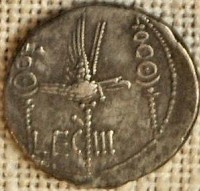M. Furius Camillus (2)
Marcus Furius Camillus (c.26 BCE - 37 CE): Roman senator and general during the reign of the emperor Tiberius.

Marcus Furius Camillus belonged to a very ancient Roman family, famous for the fact that one of its members had been Marcus Furius Camillus, the dictator who had captured Veii in 396 (according to the Varronian chronology). Although the son and grandson of this legendary Marcus Furius Camillus had gained some military fame as well, the family's fortunes were in decline after 300 BCE, and it remained unimportant for three centuries.
The Marcus Furius Camillus who is the subject of this article reached the consulate in the year 8 CE, during the reign of the emperor Augustus. His earlier history is not known, but if his career followed the normal pattern of the imperial age (the cursus honorum), he was 33 years old, and therefore born in 26 BCE, or a bit earlier. Other stages in his career must have been the quaestorship (in the year 1 BCE), the aedileship (in 2 CE?), the praetorship (in 5?), and the governorship of a small and peaceful province.
The year in which Marcus Furius Camillus and Sextus Nonius Quintillianus (by birth the son of Publius Quinctilius Varus, governor of the newly created province on the east bank of the Rhine) were consuls was remarkable because the Dalmatians and Pannonians, with whom the Roman general Tiberius (the future emperor) was fighting a hard and difficult war, sued for peace. Another event in the same year was a food crisis.
In 17 and 18, he served as proconsul (governor) in the province of Africa (= modern Tunisia). This was a very important function, because it meant that Marcus Furius Camillus now had to command a legion, III Augusta, in wartime: the province was under attack by the Numidian leader Tacfarinas and the Moorish leader Mazippa. It was a difficult war, because the tribes of these men did not live in towns which the Romans could besiege. Instead, they had to fight against guerilla warriors, the type of war the Romans detested most. However, Marcus Furius Camillus was victorious, the emperor Tiberius praised him in public, the Senate awarded him the triumphal ornaments, and he was accepted as one of the Arval brethren (a religious college). As the Roman historian Tacitus said: "for the first time in centuries, a member of the Furius family had gained military fame". He received a statue and a laurel wreath. This was all the more remarkable, because the proconsul of Africa had no earlier military experience.
Marcus Furius Camillus was the father of Livia Medullina, who was engaged to prince Claudius, a nephew of Tiberius and a future emperor. It is likely that Tiberius was behind this marriage. Camillus was a decent man with some military fame, but did not belong to the truly great noble families. The young Claudius could not start to build up a power base of his own with an innocent father-in-law. Eventually, the marriage came to nothing, because the girl died on the day of the wedding.
A son of Marcus Furius Camillus, Scribonianus, was consul in 32 (which suggests that he was born in 1 BCE or a bit earlier, when his father was about twenty-five). He was befriended with Lucius Arruntius, who adopted him. From now on, he was known as Lucius Arruntius Camillus Scribonianus. His real and his adoptive father both died in 37. Five years later, Scribonianus was governor of Dalmatia, where he revolted against Claudius, who had become emperor in 41. Within a few days, the soldiers of the Eleventh legion and the Seventh legion Paterna killed him.